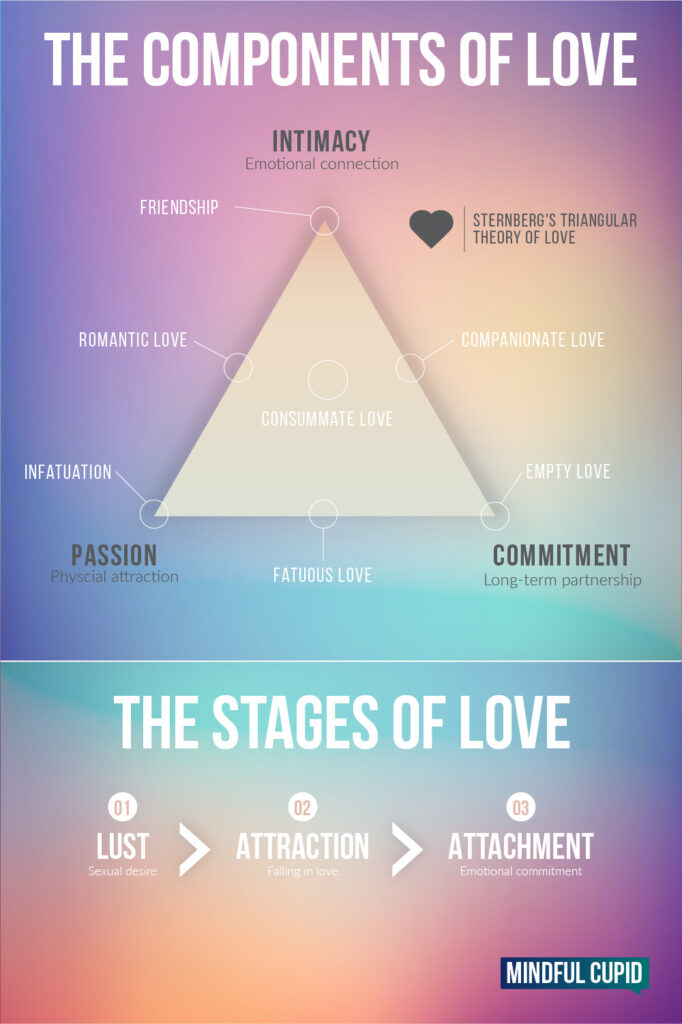This post may include affiliate links to products we think you'll find useful. We may earn a small commission if you buy through these links. Read our affiliate disclosure.
How do you know you love someone? Most people will say that “you’ll know it when you feel it,” but that doesn’t help – especially if you’ve never been in love before.
The truth is that everyone experiences love in their own way. And if you’ve been in love more than once, you might experience different feelings each time.
The good news is that love has been studied a lot by psychologists and scientists. It makes sense to study something that affects us all so profoundly. After all, wars have been fought in the name of love.
In this article, I’ll break down the types and components of love and explain the stages you go through when you fall in love. I’ll also share signs to look for that you’re in love.
Let’s get started.
What is love?
It’s impossible to agree on a single definition of love. Humans have been trying to nail it down for thousands of years, and there’s still plenty of debate. As I said earlier, everyone experiences love in their own way, and what you recognize as love might not be the same as what I would describe.
Things get even more confusing because there are several different types of love. Love can also easily be confused with lust and infatuation, and I’ll explain the difference in a moment. But scientists and psychologists can all agree on aspects of the ‘feeling’ of romantic love.
Love generally means you have strong feelings of romantic attraction, closeness, commitment, protectiveness, and desire for the person you love. These feelings are driven by a combination of hormones and neurotransmitters in your brain.
Love is a series of feelings, but you express them via your actions. You can love someone intellectually, but it becomes more real when you show them by passionately kissing them or supporting them through a tough time.
It’s also important to recognize that love will mean different things to you at different stages in life. A 20-year-old might focus on the passion and excitement of love, and in contrast, a 60-year-old is likely to be much more interested in the companionship aspects of love.
The components of love

One of the most popular theories to explain love was developed by psychologist Robert Sternberg in the 1980s. Stenberg’s triangular theory of love says there are three components of love – passion, intimacy, and commitment.
1. Passion
Passion is the physical attraction you feel towards someone, and it’s what makes you want to kiss them and have sex with them. Passion is driven by the sex hormones testosterone and estrogen.
2. Intimacy
Intimacy is the emotional connection you feel with someone, and it’s what makes you want to confide in them and share your life with them. The bonding hormone oxytocin drives intimacy, and you usually feel it after the passionate ‘honeymoon’ period has passed when you know each other on a deeper level.
3. Commitment
Commitment is the decision you make to stay in a relationship with your partner. It’s the satisfaction you get from staying with someone and working through the ups and downs. The neurotransmitter vasopressin drives commitment, and you usually don’t feel it until you’ve been in a relationship for some time.
The seven forms of love
Stenberg’s three components of love combine in the triangle to create seven different forms of love.
1. Friendship
Friendship is low on passion and commitment but high on intimacy. It’s the kind of platonic love you have for a family member or your best friend. You can confide in them and rely on them, but you don’t feel sexually attracted to them.
2. Infatuation
Infatuation is an obsession with someone without a more meaningful relationship. It’s high on passion but low on intimacy and commitment. Lust drives infatuation, so it quickly fades when the novelty wears off. Infatuation is sometimes confused with consummate or romantic love, and it can be damaging if it continues too long into a relationship.
3. Fatuous love
Fatuous love is often described as “Love at first sight.” It’s high on passion and commitment but low on intimacy. Hormones and infatuation drive fatuous love, so it often fades quickly. However, if the couple can develop intimacy, fatuous love can become consummate love.
4. Empty love
Empty love has no passion and intimacy, but it does have commitment. Couples in empty love relationships often stay together for practical reasons, like financial stability or raising children. Arranged marriages often start out as empty love relationships. Over time, some couples develop intimacy, and their relationship becomes more fulfilling.
5. Romantic love
Romantic love is all about intimacy and passion without strong commitment, and it’s often associated with one-night stands, affairs, and other short-term relationships. While it can be fun and exciting, it’s not always stable.
6. Companionate love
The typical example of companionate love is a long-term marriage where the couple has grown together over the years and developed a strong bond of friendship and mutual respect. There is intimacy and commitment, but the passion has faded over time.
7. Consummate love
Consummate love is the highest level of love and includes all three components: passion, intimacy, and commitment. It’s the type of love we often see in fairytales and Hollywood movies. While it’s not always realistic, consummate love is the goal we all strive for in our relationships.
The three stages of love
There are also clearly defined stages of love that you’ll go through as you fall in love and your relationship develops over time. These stages are lust, attraction, and attachment.
1. Lust
Lust is pure sexual desire. It’s the passion you feel for someone and what drives you to want to be with them so that attraction might form. It can be present at all stages of love, but it’s often most potent when you first meet. It’s also possible to feel lust for someone you’ve never met – like a celebrity.
The sex hormones testosterone (in men) and estrogen (in women) are involved in feelings of lust because your biology is encouraging you to reproduce.
2. Attraction
Attraction includes many of the feelings you would typically associate with falling in love. You can’t stop thinking about them. You want to be with them constantly and get jealous if you see them with another person. They make you feel crazy, and you’re addicted to them.
The neurotransmitters dopamine and serotonin are involved in feelings of attraction, and these control your pleasure and reward feedback loop. It feels good to be with your partner, which releases dopamine, which makes you want to be with them even more.
3. Attachment
Attachment is what takes over once the initial lust and attraction have calmed down. The deep emotional bond you feel for your partner helps you form a committed and healthy relationship. The hormones oxytocin and vasopressin help form your feelings of attachment.
Oxytocin is often called the “cuddle hormone” or the “love hormone” because it’s released when you hug, touch, or have sex with someone you care about. It encourages bonding and makes romantic partners feel close to each other. Vasopressin helps regulate social behavior and is sometimes called the “monogamy hormone” because it helps promote long-term relationships.
The difference between love and infatuation
Infatuation is common in the early stages of a relationship. You have a strong, almost obsessive attraction to the other person, but you don’t really know them yet or have any sense of commitment or attachment. As the relationship progresses, attraction and commitment usually replace infatuation.
Infatuation is usually short-lived and based more on looks, whereas love is deeper and longer-lasting. Infatuation can be physical, emotional, or both. For example, you might be infatuated with a celebrity because of their looks. Or you might become infatuated with someone you work with because of the strong emotional connection you feel.
Infatuation can remain if the other person doesn’t reciprocate your feelings because you never have the chance to develop a deeper relationship. Your view of them is completely based on your emotions and fantasies and not reality.
If you want to turn an infatuation into love, you need to get to know the other person better and work on building a stronger emotional connection.
How do you know you love someone?

Even though we understand the types and stages of love, everyone still experiences love in their own way. But there is a range of feelings that are consistently identified with love. So if you feel some or all of the feelings described below, I’m happy to tell you that it’s the real deal and you’re almost certainly in love.
Related post: How long should you wait before saying I love you?
1. You feel addicted to them
The early stages of new love can feel a lot like addiction. You think about the other person all the time, and you can’t get them out of your head. You want to be with them constantly, and you feel jealous if they’re with someone else.
There’s a good reason why love can feel so addictive. Many of the same chemicals in the brain that controls addiction are also involved in love.
Studies have shown that intense feelings of love activate the same chemical pathways in the brain that control reward. The neurotransmitter dopamine controls these pathways, which are also involved in the addiction response.
Dopamine is released into your brain when you think about your partner or spend time with them, and this makes you feel good, which makes you want to be around them even more. Being close to them causes more dopamine to be released, and the feedback loop continues.
You can easily see how this mimics the addiction response. The more of a drug you take, the better you feel, and the more you want to take.
This chemical response to love also explains why you feel so terrible if someone you love breaks up with you. The feeling of withdrawal from the loss of dopamine is real, and in many ways, it feels the same as withdrawing from a drug.
2. You feel safe to be vulnerable
The emotional safety you feel with someone you love is one of the most beautiful and essential feelings in a loving relationship.
Emotional safety refers to the trust you have with your partner to be completely open and honest with them. It gives you a safe space to express vulnerability without feeling judged or being scared you’ll be laughed at or dismissed as weak.
Emotional safety develops in an environment of intimacy and commitment. You have to deeply know your partner and feel an emotional connection to them to feel safe. If you feel emotionally safe in your relationship, it’s a sure sign that you love them.
3. You feel committed to them
When you commit to someone, you’re saying that you want to make them a significant part of your life. You’re willing to sacrifice other things in your life for them, and you see a future with them.
Commitment comes after infatuation and usually involves a strong emotional connection. But it can also be based on other things, like convenience or financial stability. If you’re not sure if your commitment is based on love or something else, think about how you would feel if the person you’re with left you. If you would be devastated, then it’s probably love.
4. You want to be physically close to them
Wanting to be physically close to someone is a good sign you’re experiencing true love. You feel a powerful sexual attraction, and you can’t keep your hands off them. But it goes beyond just sexual attraction. You also want to be close to them in other ways. You want to hug them, touch them, and spend quality time with them every chance you get.
5. You miss them
I’ve already discussed how dopamine is responsible for the addiction you feel for someone you’re falling in love with. These same processes explain why you miss them so badly when they’re not around.
Your brain and body learn to expect the feel-good chemical bliss of dopamine that’s released when you’re with them. When they leave, the dopamine hit stops coming, and you withdraw. This withdrawal can have a massive effect on your emotions, and it’s why you feel depressed, stressed, and a gnawing emptiness in your stomach while they’re gone.
Over time, as passion gets complemented by intimacy and commitment, these reward and addiction responses stabilize, and you don’t miss them as much. Missing them becomes more about craving their companionship and intimacy than needing a dopamine hit.
6. You occasionally feel jealous
A healthy amount of jealousy is a positive thing in a new relationship. It makes you feel possessive towards your partner, making you more committed to them. From an evolutionary perspective, jealousy is your brain telling you to keep your partner away from anyone else until you’ve had a chance to mate.
Jealousy is usually based on insecurity and fear. You’re afraid that you’re not good enough for your partner or that they’ll leave you for someone else. If you can work through these fears and insecurities, the jealousy will subside. But if you can’t, it might become toxic and damage your relationship.
7. You want to protect them
When you love someone, you feel a strong need to protect them from harm. You know there are perfectly capable of taking care of themselves, but you can’t help but worry and feel responsible for their safety.
And if they are going through a hard time you feel it just as deeply as if it happened to you. You would do anything to make it stop and take away their pain.
8. Sometimes you feel a little crazy
Falling in love can make you feel a little bit crazy at times. Your emotions are up and down like a roller coaster, and you can’t seem to think straight.
Spending time with them fills you with excitement and joy until you think you might explode. But then they don’t call when they say they will, and you spend the next day feeling anxious and worried that you did something wrong.
And when you know you’re going to see them again, you can hardly contain yourself. Your heart races, your palms start to sweat, and you almost feel dizzy.
You’re also willing to try new things for them and get out of your comfort zone in ways you never thought possible. You never thought in a million years you’d find yourself bungee jumping, but here you are.
Don’t worry. You don’t need to be hospitalized. All of these ups and downs are perfectly normal in the early stages of love. They are caused by the same dopamine-induced addiction that makes you miss them so much when they’re gone. Give it some time, and you’ll regain your logic and sanity.
9. You want to make future plans with them
Feeling the addictive rush of falling in love is all about living in the moment and enjoying the crazy ride. But as your love starts to evolve into intimacy, you begin to feel hopeful that you have a long-term future together. You begin to fantasize about what life looks like with them. Perhaps you’re living together, traveling the world, or even starting a family.
Before you know it, all your plans and goals include having them at your side, and you can’t imagine your life without them.
10. You confide in them
As your feelings evolve into real love, you start to confide in them more and more. You tell them your deepest darkest secrets, and you aren’t afraid to share your flaws and weaknesses. You know that they love you for who you are, not who you pretend to be. You also value their opinion and look to them for advice. You know that they won’t judge you, and they’ll always give you the truth, even if it’s not what you want to hear.
This level of trust and intimacy is essential for a long-term relationship. It’s based on your deep emotional connection and feeling safe enough to be vulnerable with them.
11. You feel intense empathy for them
When you love someone, you feel a deep emotional connection to them, and you understand them on a level that few people ever will, including their hopes, dreams, fears, and insecurities.
This connection allows you to empathize with them when they’re going through tough times. You can feel their pain as if it were your own, and you want to do whatever you can to make it go away. You also know how to cheer them up when they’re feeling down. You know what makes them laugh, and you know how to make them feel loved and special.
12. You make sacrifices for them
When you love someone, you’re willing to put their needs above your own, even if it means making some sacrifices along the way.
These sacrifices can be significant, like moving to a new city for their job, or minor, like skipping your favorite show to watch theirs. But either way, you’re willing to go the extra mile and do whatever it takes to make them happy.
13. You can’t imagine your life without them
When you love someone, the thought of being without them is simply unbearable. The very idea of losing them makes your heartache and your stomach churn.
This may seem like an extreme reaction, but it’s actually a very normal part of falling in love. It’s your brain’s way of telling you that this person is essential to your happiness and well-being.
14. You feel happy when they succeed
It’s normal to feel a little inferior or even jealous when you see someone else succeed. But when you love someone, you don’t feel a hint of jealousy or inferiority when you see them succeed. You feel genuine pride and satisfaction in their accomplishments.
Their happiness is your happiness, and you want nothing more than for them to reach their full potential in life. And you’ll do everything you can to support them in their goals.
15. You feel like a better person
Part of the joy of falling in love with someone is learning all about them. What food they enjoy, what music they love, and what little things annoy them. Over time, all this knowledge develops into a loving bond of intimacy.
Knowing someone intimately gives you a new perspective on life that makes you a richer and better person. They give you a new appreciation for things you never knew existed and expose you to new ideas and ways of thinking.
You might disagree with your partner on everything, and in mature relationships, this can be an incredible asset. You have someone you trust to bounce ideas off and challenge your entrenched beliefs.
Final thoughts
Love is a beautiful thing, but can also be very confusing. There are so many powerful feelings involved it can be hard to know whether you feel lust, infatuation, love, or something else entirely.
Hopefully, this article has helped clear things up for you. If you’re still unsure, ask yourself how you feel when you’re around them. Do you feel a deep sense of commitment and empathy? Do you crave their presence when they’re not around? Do you feel like a better person when you’re with them?
If you answered yes to all of these questions, then there’s a good chance you’re in love. But even if you’re not sure, the most important thing is to follow your heart and let your emotions guide you.



